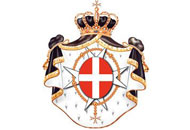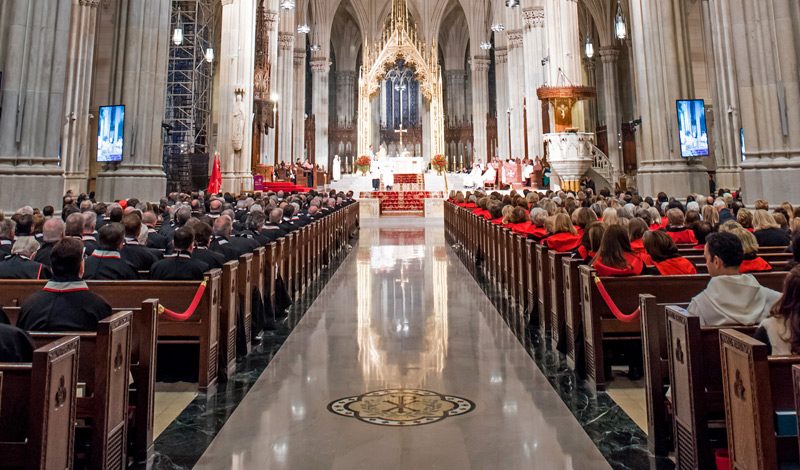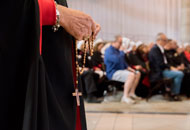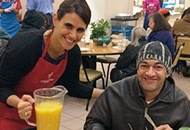Fr. Eric Hollas is a monk and priest of Saint John’s Abbey University in Collegeville, MN. He served as the executive director of the Hill Museum & Manuscript Library at Saint John’s University. He currently serves as Deputy to the President for Advancement, at Saint John’s University. Among his many activities, Fr. Eric was instrumental in initiating The Saint John’s Bible, a project in which the monks of Saint John’s commissioned Donald Jackson, scribe to the Queen of England, to create a hand-written and illuminated Bible. He also serves as a chaplain in the Western Association of the Order of Malta, and is also a member of the Order of the Holy Sepulchre. He has led several retreats for the Order of Malta including the Annual Retreat for the Subpriory of Our Lady of Lourdes for members of the Second Class.
How and when did you become involved with the Order of Malta?
Fr. Hollas: I had my first introduction to the Order of Malta in 1993 when I became director of the Hill Museum & Mansucript Library at Saint John’s University in Minnesota. That library had done work in the preservation of medieval and renaissance manuscripts, and by that time, we had already worked for twenty years in microfilming and now digitizing the archives of the Order of Malta at the National Library in Valletta in Malta. So I learned something of the Order’s history then. In 2003 I took a sabbatical at Woodside Priory outside of San Francisco. A monk there, Fr. Egon Javor, had been a chaplain in the Order for thirty years, and he always hoped that a monk would take up his work. He introduced me to members of the Order in the San Francisco area, and I knew right away that this was something I wanted to be involved in. Why? There are lots of organizations in which you write a check and that’s it. I wanted to be involved in something in which you write a check and then get down to the business of service.
What retreats or events do you find to be the most spiritually nourishing for members of the Order?
Fr. Hollas: While Lourdes is always a tremendous experience for people, I find the three-day retreats that more and more members take to be great experiences. For some, it provides a deeper introduction into the spirituality of the Order and what they can do as members. It’s also an opportunity to learn what it means to be a member of a religious order. I think there are a few members who are still not clear about what that means. But unlike other service organizations, membership in the Order of Malta involves both service that touches the lives of other people and service that is personally transformative.
Most of your work with the Order is with the Western Association; what differences, if any, do you find between the Western Association and the American?
Fr. Hollas: I’m not sure how I would characterize the differences. But certainly the very size of the American Association sets it apart. I’ve been privileged to serve members in both associations, and I’ve been able to have a sense of the individual character of the areas in the Western Association, while I’m still learning about the American Association. Also, since so many of the members of the Western Association have moved into the area, there is a natural openness to new members. In the American Association, my sense is that many areas have deep roots in the community and wear those regional histories on their sleeves. It makes both associations unique and interesting to be involved in.
As a chaplain of the Order, what do you feel a member should do on a daily basis to fulfill the mission and spirit of the Order? Weekly or monthly basis?
Fr. Hollas: I think that people should be aware of just how influential they can be in the mission of the Order as well as in the mission of the Church. It does not take an awful lot to make a difference in the lives of the poor and the sick, and we should not hesitate to extend ourselves even in little ways. I think the member who has influenced me most is the one who started to volunteer at a soup kitchen. It didn’t take long for him to realize that the people coming in were well-fed and in no danger of starvation. That’s actually a wonderful thing, because it means that our safety net is working. So he wondered what difference his service might make. Then he tried something. He began to smile at and greet each person coming through the line. The response was extraordinary. That was when he realized that he might be the only person who would smile at that person that day. He tried to treat them as people of inherent dignity — people who were created in the image of God. It’s why we do this, but his simple gratuitous smile made all the difference in the world. For me, it reinforced the notion that members of the Order do not realize the power that they have. They have the power to uplift and the power to push down. All of us can make a big difference in the lives of people, and all it need begin with is a smile and a greeting.
Is there anything specific that the chaplains of the Order are focusing on? Is there anything specific that the chaplains feel members of the Third and Second class should be working towards?
Fr. Hollas: I can’t speak for all chaplains, but I do know that many share the concern of working with leaders of the Order in firming up the continuing commitment of members. Sadly, we welcome people into the Order and within a year or two, some have drifted off into other activities and we don’t hear from them again. This is a religious order, and very much like all the other orders, membership in the Order of Malta is a lifetime commitment. It is not meant to be an honor. So I stress that the decoration that we wear is not like a military decoration. A military decoration honors a soldier for what he or she has done. A decoration of the Order is not recognition for what someone has done. Rather it is recognition of what they are called to do. The second area of emphasis is on the cultivation of a spiritual life that builds on our baptism and which we continue to nourish in the sacramental life of the Church. Spiritual growth, which also includes participation in regular retreats, is important. Finally, I encourage members of the second class to reach out as mentors to new members and as servants to the elderly members who are on the last leg of their earthly pilgrimage. But, of course, everyone can and should do that, not just members of the second class.
The Pilgrimage, the hospitals and charitable works that the Order and individual members support all demonstrate how the Order is living up to caring for Our Lords the sick and the poor but regarding defense of the faith, do you feel the Order should be doing more? Less?
Fr. Hollas: I think that the charitable works of the Order are tremendously important, but members also have an opportunity to cultivate and nourish the faith. We all know people who have drifted from the faith into which we were baptized, and sometimes those people are our relatives. No amount of nagging will bring people back. But the surest way of bringing people to the faith is to show in our lives how transformative that faith can be. Along those lines, it’s amazing how few Catholics have ever invited a friend or relative or neighbor to church. That may hark back to the days when we lived in thoroughly Catholic neighborhoods. Not so any more, not least because so many people are unchurched. And so if we want to evangelize and introduce people to the vibrant faith that animates our own lives, then invite someone to go to church with you. It may not even be for Mass. Giving a simple tour of a church shows an interest in sharing the faith with others. In this way, our own members can demonstrate their love for the faith and their willingness to be instruments of its growth and nurture. So I like to think of the faith as glowing embers within us. When we share it, it flames into something wonderful to behold.





